- Home
- Peter Carey
My Life as a Fake Page 15
My Life as a Fake Read online
Page 15
This all occurring before the Xerox age, Chubb had photographic copies made of both the letter and the drawing and sent them to Noussette. I am sure you know who this is, he wrote, and asked her for money so he could go to Indonesia and fetch the child. If the mother recognised the man, she made no mention of him in her reply.
‘Dear C’—and in being unable to spell out his name gave some unintended sign of the distress she felt.
It was cruel of you to send me the Defoe. It broke my heart all over again. I have every right to hate you, but instead I feel very sorry for you. For now you know, as I certainly do, what it feels like to have a child stolen from you. You hurt me very badly, and I wished you ill, but I can see the course of your life now and understand that you will finally be made to suffer even more than those of us who you have injured so carelessly. There is some justice, so it seems.
The letter was unsigned. She did, however, enclose a cheque for a considerable amount of money and Chubb was, as a result, able to buy a ticket to Bali, and from there he began the long and fruitless journey to the northern coast, and thence to Java and Yogyakarta, where he finally had some small amount of luck. That is, he discovered the Agam Hotel, where ‘Mr Bob’ had stayed during the year he doggedly pursued his studies in Javanese. The owners remembered him, and happily let his room to Chubb.
No reason to stay. No reason to go. I waited.
In those days Indonesia was under martial law and seems to have been rather free of tourists, but even in the middle of this particularly tumultuous year, a certain number of Europeans made the trip along the volcanic spine of Java to Yogyakarta, where they would put up at the Agam Hotel. In 1956 these travellers would have been shown Donald Defoe’s charcoal sketch. One of them, a German botanist named Karl Burkhardt, recognised the subjects. The man and girl were living in a lodge on Lake Toba in Sumatra. The child had had very serious dysentery, and Burkhardt himself had cured her with rice water.
So, cried Chubb, he does not care for her.
Oh no, the German said, it is very touching to watch him with her, how he combs her hair and has her clean her teeth.
Chubb abruptly excused himself, went to his room, returned to the front desk, and settled his bill. He took a trishaw to the railway station and, seven hours later, at one in the morning, boarded a crowded train for Jakarta. Then began a long and difficult journey: small rebellions were erupting here and there, and soldiers were forever taking him aside to learn his business. But he persisted and finally was rowed across the eerie flat surface of Lake Toba. He came ashore on the island of Samosir, where the German said the lodge was situated.
Of course there was nothing there, or worse than nothing. He was shown the vacant lodge, and there, tucked up inside the low rafters, he found a collection of leaves and flowers all roughly glued to the brown paper pages of a handmade scrapbook. Had his daughter made this with her abductor? It was painful to imagine.
Once more Chubb fell into a slump, which differed not in nature but in degree from those he’d suffered in both Sydney and Yogyakarta.
Lake Toba, according to Slater, is breathtaking and the people are famous for their good looks and beautiful voices, but Chubb’s only memory of the place is of dreary water, interminable nights when he lay in darkness, his head aching, in a fug of burning cow dung.
What did you do there, I asked.
Black dog, Mem.
How long did you stay?
He shrugged. All he was certain of was that it was wet season when a small boy in a motor boat arrived with a letter addressed to him. The stamps were Malaysian, he said, the postmark Penang, and it was addressed in the beast’s own hand: ‘Mr Chubb, Samosir, Sumatra.’
But listen, Mem, to the note inside. ‘Dear Chubb, the little girl has died. She contracted a fever. It did not take very long.’
How horrible!
No, Mem, no. It cheered me up. That’s the point. Whatever blow he intended to deliver, it bounced right off me-lah. I knew she was alive, and that he now was frightened of me.
32
All through the hot morning, he had interrupted his story to preen at himself, smoothing his close-shorn head, buttoning and unbuttoning the jacket of his new suit, fussing with his trousers until they were suitably loose across his sturdy knees. This suit, at first a rather touching novelty—which indeed gained him entry to the hotel—soon turned into a time-wasting distraction as he continually interrupted himself to worry at the motives of his benefactor. Time, of course, was getting very short. Today was the fourteenth. My meeting in London was on the nineteenth.
At lunch I took him out to eat beside the pool, but not even food could stop him fretting about John’s gift.
If Slater thinks I am angry because he slept with Noussette, he’s wrong.
You shouldn’t worry.
He could have saved his money, Mem. I am not the jealous type.
Certainly you were when—I hesitated, not knowing what to call the kidnapper, if indeed there was a kidnapper—when ‘McCorkle’ stole your daughter.
That was not jealousy, Mem. Jealousy is a little thing. I had known this child for one awful week, but what I had seen was life.
His eyes—too big, too shiny—demanded my agreement.
I embarrass you, he said.
Of course not.
I must serve life, do you see?
But he did embarrass me, and irritate me too. I was stuck with transcribing this story when all I wanted was the rest of that damn poetry. Mr Chubb, I said. You remember the first day you came to the hotel, you brought McCorkle’s manuscript.
I see through you! He was suddenly, inexplicably delighted. You want to go straight to pudding. Look—you’re blushing. You think I don’t know what you want? Would you be listening to me now if you hadn’t read McCorkle? Here, he said, your pen is running dry. Take mine.
He continued—maliciously, I thought: I came straight to Malaya from Sumatra.
And I had no choice. ‘Sumatra, Malaya.’ I wrote it down.
There was a steamer, he continued coolly, from North Sumatra to Penang. Horrid. Lord Jim or even worse—all of the Malays crowded below the decks in this filthy, sweaty dark. They were village people, very kind to me even though I was in a frantic hurry and kept pushing that charcoal drawing on them. At first they had no clue, but when I got through to them they were very affected. By the time we docked at Swettenham Pier they all came to say goodbye, fifty of them, just to wish me luck. But what could I do? Now that I saw Penang I understood what I was up against. Needle in a haystack. Hopeless. I ended up in a hotel—lovely old colonial place with the waves crashing against the sea-wall at the back. Tall palms, Chinese waiters—five hundred years old in stiff white jackets—and the famous Albert Yeoh playing ‘Misty’ in the Anchor Bar. Would have been a perfect place to bring a pretty woman. But it was not an adult I was in love with, and with her not there I had no peace. So I wrote, on a wrought-iron table in the garden. It was agony like cutting words into your own chest, but finally I knew I was a poet.
I have been an editor long enough not to give a damn about how a poet looks or talks, but there was something weirdly persuasive about Christopher Chubb in full flight.
May I read those poems, I asked.
His head jerked up. Ha! You have already!
No, no, the ones you wrote in Penang.
You saw them.
What a horrid, twisted smile he gave me. So you are McCorkle, I said. You have hoaxed me!
This drew from him a strangled cry and then a queer convulsion—grabbing his head as if he wished to pull it down inside his ribs. Have you listened to nothing?
I began to speak but he rudely cut me off.
If I could write McCorkle’s poem, do you think I would not claim it? No, you listen to me now. Do you imagine I would invent this pain? He thumped his chest. Who would want to feel like this?
I’m sorry, I must have been sitting here for rather too long.
Then you should unders
tand, he said, and in his fury his mouth gave a nasty twitch. I am Chubb. He is McCorkle.
Frankly, that is a puzzle.
There is no bloody puzzle, can’t you see? I could never, ever, have made that poem. Can’t you imagine how hard that is to say?
So where else could I have read what you wrote in Penang?
Smirking, he took a letter from the inside pocket of his jacket and laid it on the table. Even from where I sat the handwriting was recognisably my own.
You rejected me in 1959. Perhaps you will reject McCorkle too?
I would hope, I said, not to miss my chance to judge.
Then you write down my story, miss. And we will see.
What choice did I have but to uncap his nasty little pen?
And at that very damn moment I saw John Slater making his way down the steps from the Pool Bar. As he skirted the pool he waved some airline tickets.
Go away, I thought. He did not know what he was interrupting. He threw the tickets on my lap.
All set for the eighteenth.
This is exactly what I had demanded, but I did not thank him. I wished only that he would go away. It appears, I said, that I have previously read Mr Chubb. Thus I’d hoped to impress him that this was a private conversation. Nonetheless, he pulled up a cane chair and parked himself between us.
She marked up your stuff, old man? Oh, Miss Wode-Douglass began that business very young. He patted my knee. I pushed his hand away and glared at him while he ordered Singapore Slings for all of us.
Micks, my darling, what was the name of your vitriolic little friend? Was it Annette?
Go away, John.
Do you know, Christopher, these two girls began correcting their betters at the ripe age of fourteen.
Don’t be a beast.
The mischief was making Slater’s complexion a healthier colour. He took an angel on horseback from the table, grinning rather wickedly. Beast? I’m being a bloody dormouse, darling. They used to mark up my poems, Christopher. Girls, little slips of things. They would tear verses from my bloody books and send them to me covered with their comments.
Once, John.
At least ten times—and of course I forgave you, for all sorts of reasons. But I was bloody scared of you, Micks.
He gripped my hand and I was shocked to see, through the storm of my annoyance, that his eyes had suddenly filled with tears.
Chubb must have seen this too, and was already excusing himself. I took John’s hand, in fact burrowed my own inside his. It was impossible not to be aware of the old goat’s considerable affection, and it made me not embarrassed in the least, but somehow grubby and deceitful, to be carrying on this negotiation behind his back.
I never published a great poem, John.
He blinked. Where did that come from?
Nowhere. I’ve been thinking about it since we arrived.
Well, old darling, I’d have to say I never wrote a great poem.
Even now, when I think of this moment, I wish I could have brought myself to contradict him. Instead I kissed his hand. It was an awful thing to offer—sympathy.
33
It happened to slip out, after lunch, that Chubb’s lovely hotel in Penang was none other than the Eastern and Oriental, and I had to wonder why an impecunious poet would even think of staying at the E&O, or ‘Eat and Owe’ as it was then known. I had not yet visited Penang, but the E&O was famous, like Raffles in Singapore, as a very pukka-sahib sort of place, once favoured by Residents, rajas, and those dreadful ‘Twickenham Duchesses’ who would gather on the lawn on Friday night to complain too loudly about their servants. While this type of establishment occasionally welcomes guests who arrive in something less than black tie—wealthy tin-miners, say, who have travelled by mule through the jungle in order to take tiffin in the long room—they are sure to have been perplexed by Chubb’s rather down-at-heel appearance, so I asked him how he had been received.
I had Australian pounds, he said sharply. There was some fuss with the exchange rate.
Whatever that was code for, I do not know. Certainly he was almost broke, and checking into the E&O was self-defeating. Had he wished to run out of money and therefore be permitted to give up his search? I suggested this to him. Who, I offered, would not understand his dilemma?
Don’t tunjuk, you, he snapped. Better you listen.
The morning after he arrived, he was shown to his breakfast table by a shabby, felt-covered screen which did nothing to muffle the continual slap and screech of the swinging kitchen door. His dining companion was a very dark-skinned Tamil who seemed violently offended by the food he was being offered.
Of course, said Chubb, we were in Siberia, isn’t it. I was beyond caring, Mem, but the Indian was in a state. They would not give him face. An educated man. Very sharp, clever tongue to him. He ticked off the waiters. Called in the maître d’, a Scot with thorny ginger eyebrows. Ticked him off as well, declared the scrambled eggs so bad they might have been served at Eton. Well, the Scot’s eyes looked like bloody murder. He snatched the dish away, so fierce that half the meal fell on the floor.
I asked the Tamil, was this so?
Was what bloody so?
Did you go to Eton, Tuan?
It was not a silly question but you should’ve seen his lip curl. Cheh! Was I some kind of moron? No, he was a cikgu, a schoolmaster. Chemistry and Physics.
And you, he asked, bored rigid before I answered.
I told him I was attempting to find my kidnapped child.
The maître d’ arrived with more eggs, same vintage as the last, but the Tamil’s mood had changed completely. He pushed the plate aside and when he turned his head I saw his wall-eye—one eye on the pot, the other up the chimney, as the saying goes. He fixed the good eye on me, but perhaps it was the bad.
Glass falling on a rock, he said. You must be worried sick.
I had already been shown much sympathy but his injured beauty was particularly affecting, a badge of his own suffering. I liked him immediately, enormously.
When I placed the portrait of monster and child on the table, he stared at it, his brow twisted, nostril flared, then he placed a delicate hand upon my wrist. The rickshawallahs will help you, he said, much kindness in his voice. Talk to them, he said. A little tea money, that’s all.
Tea money?
A few dollars, small payment.
He was dressed exactly like a school teacher—closed coat, silver buttons, an array of pens and pencils in his pocket— but all I understood was the big gold watch worn loose like a bracelet on his wrist. Who could know what his idea of small payment might be? I told him my daughter might be dead already.
He crossed himself. I was not to say such things. He was very fierce, very definite, like someone accustomed to giving orders, also like a small bird with fixed ideas. He took out a pen and rapped McCorkle’s nose with it.
The rickshawallahs know every white man, he said, where they live, where they drink. They will be finding this fellow for you and we will get your daughter back. Take my word.
You see, Mem, I was being saved. But I did not dare believe my luck. Who was this man? His skin was black as coal. His eyes were crooked. My mother would have thought him marked by God, more wrong than just the eyes. Me, of course, she would have judged more harshly still. What blasphemy. I had made a life.
The Tamil poured himself a second cup of tea and as he squeezed the lemon he invited me to come and live with him. His mouth was very pink, a wicked edge to it. I thought, Whoa, Dobbin. Not for me, that business. But when I said no—my mother too, in chorus—his fine face appeared so hurt I felt a cad.
The house is free, he said, provided by the school. I am being at the E&O one night only, to let the roofers do their work.
Finally I understood he did not plan to bugger me.
We shall celebrate my new roof, he said.
When I did not immediately respond, he glared sideways at me as fierce as any kookaburra with one eye on a worm. Gal iron–ah.
You may not understand, Mem, what a gal-iron roof means to an Australian. All my childhood I lived under galvanised iron. Such peace, the lovely din of rain at night, it was home to me. Also, although I had my hopes of funding in the future, the dough was running very low.
I asked Chubb to explain his ‘funding’ and he admitted he’d sent an E&O postcard to Noussette in which he had quoted from McCorkle’s horrid correspondence and repeated his belief that the child was still alive. Five hundred pounds was what he asked for.
I can pay no rent, he said to the Tamil.
My name is Kanagaratnam Chomley but you call me Mulaha or K.G. if you like. You must come with me and see your digs, and on the way I will talk to these rickshawallahs. Did you report the crime to the MPs?
Who?
Police.
No.
Good man, he said, but did not explain.
Chubb still did not know whether to trust him, but the two of them checked out of the E&O together, the diminutive K. G. Chomley all starch and spit and polish, Chubb slovenly in socks and sandals, short-sleeved shirt, pleated brown F.J. trousers made in Warrnambool, Victoria. Seperti durian dengan mentimum, Chubb told me, an unlikely pair, the durian and the cucumber.
On Farquhar Street they encountered the usual crowd of rickshawallahs, as loud and quarrelsome as seagulls in the offseason. This type of Asian scene had always alarmed Chubb, who now threw up his arms as if to shoo away the yellow hordes.
K. G. Chomley comfortably immersed himself in their sweaty, nicotine-stained midst and was soon talking in rough Hokkien with two old men in white singlets and ink-blue shorts. Money was passed. Chubb saw this and fretted about how much he owed.
Don’t worry, said Chomley, I spend you. Only tea money.

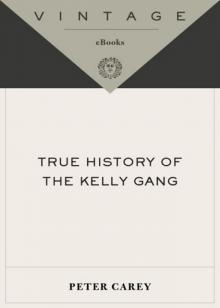 True History of the Kelly Gang
True History of the Kelly Gang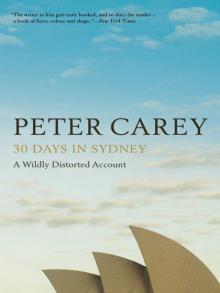 30 Days in Sydney: A Wildly Distorted Account
30 Days in Sydney: A Wildly Distorted Account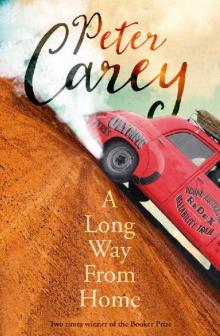 A Long Way From Home
A Long Way From Home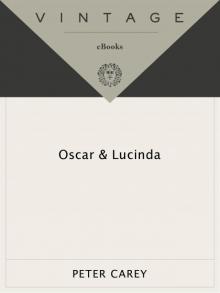 Oscar and Lucinda
Oscar and Lucinda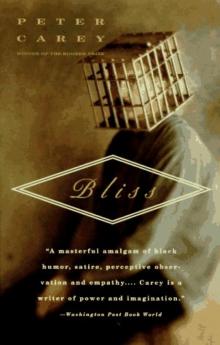 Bliss
Bliss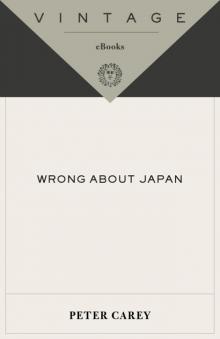 Wrong About Japan
Wrong About Japan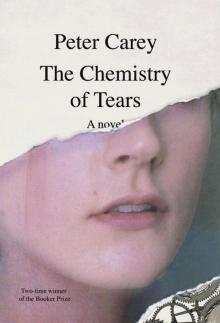 The Chemistry of Tears
The Chemistry of Tears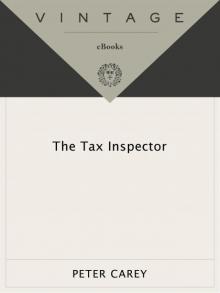 The Tax Inspector
The Tax Inspector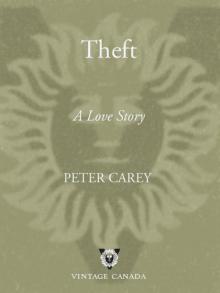 Theft: A Love Story
Theft: A Love Story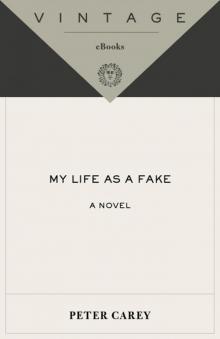 My Life as a Fake
My Life as a Fake Collected Stories
Collected Stories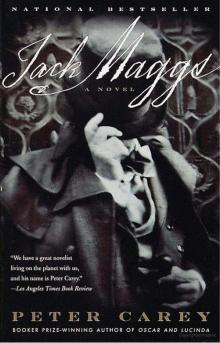 Jack Maggs
Jack Maggs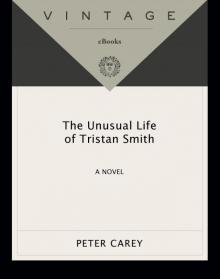 The Unusual Life of Tristan Smith
The Unusual Life of Tristan Smith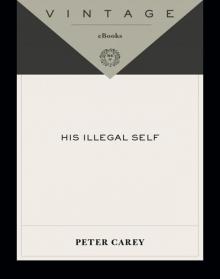 His Illegal Self His Illegal Self His Illegal Self
His Illegal Self His Illegal Self His Illegal Self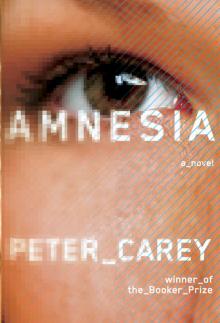 Amnesia: A Novel
Amnesia: A Novel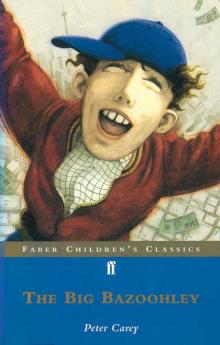 The Big Bazoohley
The Big Bazoohley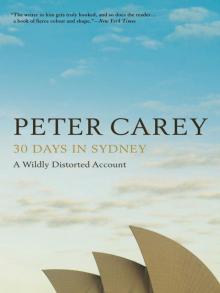 30 Days in Sydney
30 Days in Sydney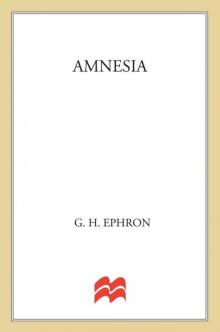 Amnesia
Amnesia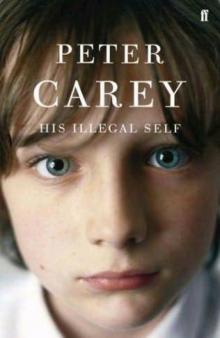 His Illegal Self
His Illegal Self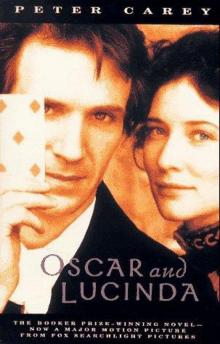 Oscar and Lucinda bw-1988
Oscar and Lucinda bw-1988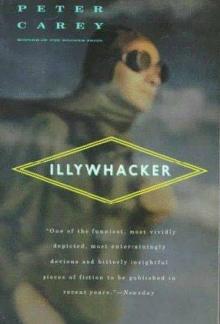 Illywhacker
Illywhacker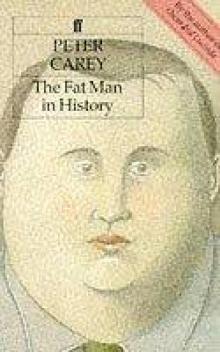 The Fat Man in History aka Exotic Pleasures
The Fat Man in History aka Exotic Pleasures